- Home
- William Gibson
All Tomorrow's Parties bt-3 Page 18
All Tomorrow's Parties bt-3 Read online
Page 18
'They shouldn't have put it there.
Harwood's eyes come in from their private distance. 'I don't believe I've ever heard you express so specific an opinion.
No reply.
'You'll have a second chance to see it. I want you to find out what our pensive friend here is thinking about.
'Is this concerned with what you implied when we spoke earlier, that something is on the verge of happening?
'Yes.
'And what would that be?
Harwood considers him from the distance behind his glasses. 'Do you believe in forces of history?
'I believe in what brings us to the moment.
'I seem to have come to believe in the moment myself. I believe we are approaching one, drawn to it by the gravity of its strangeness. It is a moment in which everything and nothing will change. I am seeking an outcome in which I will retain viability. I am seeking an outcome in which Harwood Levine will not have become four meaningless syllables. If the world is to be reborn, I wish to be reborn in it, as something akin to what I am today.
Thinking of the possible number and variety of crosshairs that must be trained on him now, hidden telepresent weapons platforms. He is fairly certain, nonetheless, that he could kill Harwood, if the moment required, though he also knows that he would almost certainly predecease him, if only by some fraction of a second. 'I think you have become more complicated, since we last met.
'Complex, Harwood says, and smiles.
42. RED GHOSTS OF EUROPEAN TIME
FONTAINE makes himself a cup of instant miso on the hotplate. This is what he drinks before bed, a soothing saltiness and bits of seaweed at the bottom. Thinking of Skinner's girl and seeing her again. Usually when people leave the bridge they don't come back. Weirdness around her departure but he forgets what exactly. Not good for the old man but his time nearly done then anyway.
Tick tick of the silent boy under the eyephones, hunting watches. Fontaine pours his miso into a cup missing its handle, savoring the aromatic steam. Tired now, he wonders where the boy can sleep here or if indeed he will. Maybe sit up all night hunting watches. Fontaine shakes his head. The ticking stops.
Carrying his soup, he turns to see what's arrested the ceaseless hunt.
There on the screen of the notebook, in the boy's lap, is a scan of a battered Rolex 'Victory, an inexpensive wartime model for the Canadian market, worth a fair bit now but not in this condition. The steel case looks rough and the dial has faded unevenly. Black Arabics from one to twelve are crisp, but the inner chapter, red, European time, is almost gone.
Fontaine sips his miso, looking down, wondering what it is this boy sees to hold him, in the red ghosts of European time.
Then the boy's head sags under the weight of the eyephones, and Fontaine hears him start to snore.
43. LIBIA & PACO
LANEY finds himself on an island in that mind-wide flow he ceaselessly cruises.
It is not a construct, this place, an environment proper, so much as a knotting, a folding-in of information rooted in the substrates of the oldest codes. It is something like a makeshift raft, random pieces thrown together, but it is anchored, unmoving. He knows that it is no accident, that it has been put in his path for a reason.
The reason, he soon finds, is that Libia and Paco wish to speak with him.
They are associates of the Rooster, junior denizens of the Walled City, and present here as a sphere of mercury in zero gravity and a black, three-legged cat, respectively. The sphere of mercury (Libia) has a lovely voice, a girl's, and the three-legged cat, who is also missing one eye and one ear (Paco) has a cunningly modulated growl Laney thinks he remembers from a Mexican cartoon. They are almost certainly from Mexico City, these two, if geography needs to be taken into consideration, and very likely belong to that faction of flaming youth currently opting for the re-flooding of the Federal District's drained lakes, a radical urban reconfiguration that for some reason had obsessed Rei Toei in her final month in Tokyo. She had developed a fascination with large human settlements in general, and Laney had been her guide through certain of the stranger info-prospects presented by what passes, this century, for town planning.
So he hangs here, at the juncture of these old code-roots, in a place devoid of very specific shape or texture, aside from Libia and Paco, and hears them.
'The Rooster tells us you feel someone is watching you watch Cody Harwood, says the sphere of mercury, pulsing as it speaks, its surface reflecting vehicles passing in some busy street.
'It might be an artifact, Laney counters, not sure he should have brought it up with the Rooster, whose paranoia is legendary. 'Something the 5-SB generates.
'We think not, says the cat, its one-eyed filthy head propped atop an arrested drift of data. It yawns, revealing grayish-white gums, the color of boiled pork, and a single orange canine. Its one eye is yellow and hate-filled, unblinking. 'We have determined that you are, in fact, being observed in your observation.
'But not at the moment, says Libia.
'Because we have constructed this blind, says the cat.
'Do you know who it is? Laney asks.
'It is Harwood, says Libia, the sphere quivering delicately.
'Harwood? Harwood is watching me watch him?
'Harwood, says the cat, 'dosed himself with 5-SB. Three years after you were released from the orphanage in Gainesville.
Laney is suddenly and terribly aware of his physical being, the condition of his body. His lungs failing in a cardboard carton in the concrete bowels of Shinjuku Station.
Harwood. It is Harwood whom he has sometimes imagined as the presence of God.
Harwood, who is…
Like him.
Harwood who sees, Laney now sees, the nodal points. Who sees the shapes from which history emerges. And that is why he is at the very heart of the emergent cusp, this newness Laney cannot quite glimpse. Of course Harwood is there.
Because Harwood, in a sense, is causing it.
'How do you know? he hears himself ask, and wills himself beyond the failing strictures of his body. 'Can you be sure?
'We've found a way in, Libia chimes, the sphere distorting like a topographic learning aid, turning reflections of moving traffic into animated Escher-fragments that fly together, mirroring one another. 'The Rooster set us to it, and we did.
'And does he know? Laney asks. 'Does Harwood know?
'We don't think he's noticed, growls the cat, purple-brown scabs caked on the absence of its ear.
'Watch this, says Libia, making no effort to conceal her pride. The intricately lobed surface of the mirrored shape flows and ripples, and Laney is looking into the gray eyes of a young and very serious-looking man.
'You want us to kill him, the young man says. 'Or do I misunderstand you?
'You understand me, says Harwood, his voice familiar, unmistakable, though he sounds tired.
'You know I think it's a very good idea, says the young man, 'but it could be done with greater surety if you gave us time for preparation. I prefer to choose the time and the terrain, if possible.
'Not possible, Harwood says. 'Do it when you can.
'You don't have to give me a reason, of course, the young man says, 'but you must realize I'm curious. We've suggested his removal since you contracted with us.
'It's time, Harwood replies. 'The moment.
Wind catches the young man's dark scarf. It flutters, strobing the image. 'What about the other one, the rent-a-cop?
'Kill him if it seems he's likely to escape. Otherwise, it might be useful if he could be questioned. He's in this too, but I don't see exactly how.
Libia becomes a sphere again, rotating.
Laney closes his eyes and gropes in the close electric dark for the blue cough syrup. He feels the hate-filled yellow eye watching him, but he imagines it as Harwood's.
Harwood knows
Harwood took the 5-SB.
Harwood is like him.
But Harwood has an agenda of his
own, and it is from this agenda, in part, that the situation is emerging.
Laney cracks the seal. Drinks the blue syrup. He must think now.
44. JUST WHEN YOU THINK.
THE rain wasn't coming back, Chevette decided, shrugging her shoulders against the weight of Skinner's jacket.
She was sitting on a bench, behind a stack of empty poultry crates, and she knew she should be going somewhere but she just couldn't. Thinking about Skinner dying here, about what Fontaine had said. The knife in the inside pocket, its handle digging into her left collarbone, the way she was slouched. She straightened her back against the plywood behind her and tried to pull herself together.
She had to find Tessa and get back to the van, and she had to do that, if she could without running into Carson. It was possible, she figured, that he hadn't even seen her run out, even though she was sure somehow that when she'd seen him, he'd been looking for nobody but her. But if he hadn't seen her, and he wouldn't have found her there, then probably that bar would be the last place she should expect to find him now. And if he had seen her, then he wouldn't think she'd go back there either. Which would also put him somewhere else. And it was possible that Tessa, who liked her beers, would be there still, because she sure hadn't been keen on bedding down in the van. Probably Tessa thought that the bar was way interstitial, so it might just be that Chevette, if she was careful about it, could slip in there and get her, and get her back to the van. Carson wasn't too likely to come sniffing around the foot of Folsom, and if he did he was liable to run into the kind of people who'd take him for easy meat.
But it was no good sitting here, this close to chicken crates, because that was a good way to catch lice, and just the thought of it made her scalp itch. She stood up, stretched, smelling the faint ammonia tang of chicken shit, and set off through the upper level toward the city, keeping an eye out for Carson.
Not many people out now, and none of them tourists. The rain could do that, she remembered. Once again she got that feeling that she loved this place but wasn't really a part of it anymore. Kind of twisted in, like a hook, not a big feeling but sharp and deep. She sighed, remembering foggy mornings when she'd come down from the cable tower with her bike over her shoulder and pumped it over to Allied, wondering if Bunny'd have a scratch for her right off, a good ticket to pull, or if he'd give her a deadhead, what they called a pickup outside the city core. She'd liked a deadhead sometimes, because she got to see parts of town she might not have ridden before. And sometimes she'd wind up clean, what they called it when you didn't have any deliveries, and that could be great too, just go over to the Alcoholocaust or one of the other messenger bars and drink espresso until Bunny paged her. It had been pretty good, riding for Allied. She'd never even eaten it, wiped out bad, and the cops weren't as book-happy if you were a girl; you could get away with doing sidewalks and stuff. Not that she could imagine going back to it now, riding, and that brought her mood back, because she didn't know what else she could do. Whatever, she wasn't going to star in any new versions of Tessa's docu.
She remembered this skinny tech named Tara-May, somebody Cops in Trouble had sent over to grab footage of poor Rydell, who'd only ever wanted to feature in a segment of that thing. No, she corrected herself, that wasn't fair, because she knew that what Rydell had really wanted was to be a cop, which was what he'd started out to be in Tennessee. But it hadn't worked out, and then his episode hadn't worked out, let alone the mini-series they'd talked about spinning off. Mainly, she supposed, because what Tara-May had shot had convinced the Cops in Trouble people that Rydell looked a little on the heavy side on TV. Not that there was any fat on him, he was all muscle and long legs, but when they shot him he didn't look like that. And that had driven him sort of crazy, that and Tara-May always going on about how Chevette should take speech and acting classes, learn all these martial arts, and give up drugs. When Chevette had made it clear she didn't do drugs, Tara-May had said that that would make networking a little harder, not having anything to quit, but that there were groups for everything and that was probably the best way to meet people who could help you with your Career.
But Chevette hadn't wanted a career, or not the way Tara-May meant it, and Tara-May just hadn't been able to get that. Actually there were a lot of people like Tara-May in Hollywood, maybe even most people were; everybody had something they 'really' did. Drivers wrote, bartenders acted; she'd had massages from a girl who was really a stunt double for some actress Chevette had never heard of yet, except she hadn't really ever been called, but they had her number. Somebody had everybody's number, but it looked to Chevette like the game had all their numbers, every one, and nobody really was winning, but nobody wanted to hear that, or talk to you much if you didn't buy into what they 'really' did.
Now she thought about it, that was part of what had gotten between her and Rydell, because he'd always buy into that, whatever anybody told him they really were. And then he'd tell them how he really wanted to do an episode of Cops in Trouble, and how it looked like he actually would, because Cops in Trouble was paying his rent now. Which nobody wanted to hear really, because it was a little too real, but Rydell never got that. And then they'd hit on him for phone numbers, names, intros, and start slipping him disks and lists of credits, hoping he was dumb enough to go back and try to show them to producers. Which he was, or anyway good-hearted enough, and that hadn't helped him any with the people at Cops in Trouble either.
And that, somehow, was how she'd wound up with Carson. Rydell sitting on the couch in that apartment with the lights off, watching one old Cops in Trouble after another, looking lost, and she just hadn't been able to handle it. It had been fine when they'd had things to do together, but when it came to just being together, that hadn't seemed to work, and Rydell going into that sad thing when it had started to look like it wasn't going to work out with the show…
But here was the bar, a small crowd around the door now and the sound of music she'd been hearing but not really listening to, which died as she got up close to the crowd.
Place was packed. She slid in sideways between a couple of Mexicans looked like truck drivers, had those steel chisel-toe things tacked to the front of their black cowboy boots. Inside, over the heads of the people packed on the floor, she could see Creedmore with a microphone in his hand, grinning out over the crowd. It was a dancer grin, ten thousand watts of bad electricity, and she saw he had the start of that thing that dancer did to your gums.
People were clapping and whistling for more, and Creedmore, his face running with sweat, looked like he was intending to give it to them.
'Thank you, thank you kindly, she heard Creedmore's amplified voice say. 'Now this next number's one I wrote myself, and it's going out soon as our first single, Buell Creedmore and his Lower Companions, and it's called 'Just When You Think You've Got It Dicked… or anyway that was what she thought she heard him say, but then the band kicked in, loud, with the guitarist choking steely serpentine chords out of a big, shiny, old red electric, and she couldn't make out any of the words. Although she had to admit it sounded like Creedmore could sing.
They were jammed in here so tight, it made it hard to keep a lookout for Carson, but on the other hand it wasn't too likely he'd be able to see her either.
She kept moving, as best she could, trying to find Tessa.
45. JACK MOVE
RYDELL had taken a surveillance course, back at the academy, and his favorite part had been going out and following people. It wasn't something you did alone, but with at least one partner, and the more partners the better. You learned how to trade off, somebody taking your place, and how to deal up ahead of the subject so you'd be ready when the next guy needed to trade off. That way the subject never had the same person behind him for too long. There was a definite art to it, and when you got it down it was sort of like a dance.
He hadn't really gotten the chance to put it into practice, in his very brief career as a police officer, or later when he'd worked
for IntenSecure, but he felt like he'd been pretty good at it, and it had given him an idea of what it would feel like if you were being followed, and particularly if you were being followed by some people who knew how to do it right.
And that was what he found himself thinking about now, as he shouldered the duffel with Rei Toei's projector in it and prepared to depart this pathetic excuse for a crime scene. If Laney had wanted him to attract someone's attention by standing here, well, he'd stood here. But maybe now, he thought, he was getting that watched feeling because Laney had told him he'd be sure to be noticed if he came here.
Could be nerves. Maybe, but actually he didn't feel nervous, just tired. He'd driven all night up the coast with Creedmore, and all the downtime he'd had today had been when he'd fallen asleep listening to Rei Toei. What he felt like now was going back to his room, checking out the projector to see if she'd come back, then hitting the bed.
But there it was, that prickling at the back of his neck. He turned and looked back, but there was nobody, just the place where the Kil'Z had been sprayed over dried blood.
Guy going by in the direction of Oakland and Rydell's room.
Young guy with dark military-buzzed hair, black coat, black scarf up around his face. Seemed not to see Rydell, just kept walking, hands in his pockets. Rydell fell in behind him, about fifteen feet.
He tried to imagine this place the way it had been before, when it was a regular bridge. Millions of cars had gone through here, this same space where he walked now. It had all been open then, just girders and railing and deck; now it was this tunnel, everything patched together out of junk, used lumber, plastic, whatever people could find, all of it lashed up however anybody could get it to stay, it looked like, and somehow it did stay, in spite of the winds he knew must come through here.

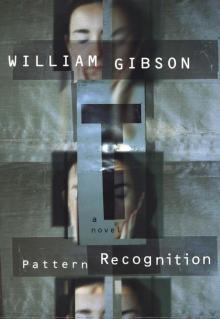 Pattern Recognition
Pattern Recognition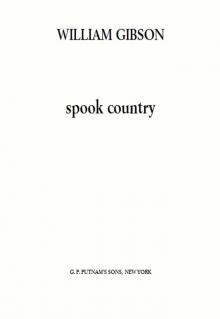 Spook Country
Spook Country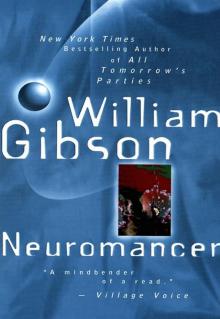 Neuromancer
Neuromancer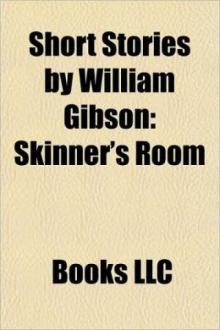 Skinner's Room
Skinner's Room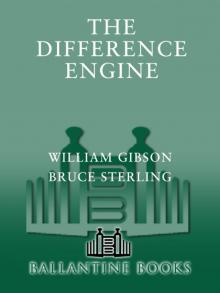 The Difference Engine
The Difference Engine Mona Lisa Overdrive
Mona Lisa Overdrive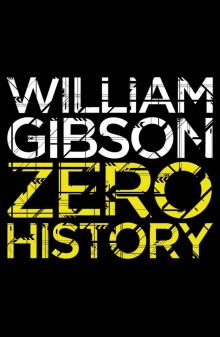 Zero History
Zero History The Peripheral
The Peripheral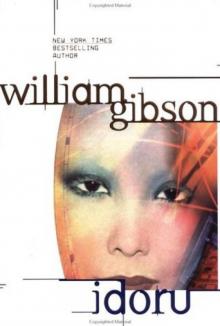 Idoru
Idoru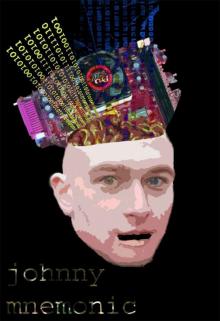 Johnny Mnemonic
Johnny Mnemonic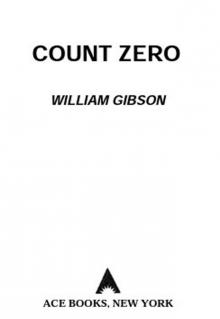 Count Zero
Count Zero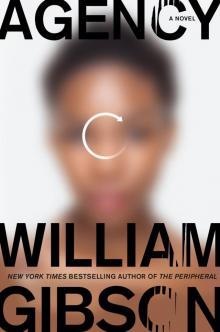 Agency
Agency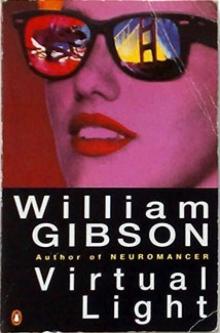 Virtual Light
Virtual Light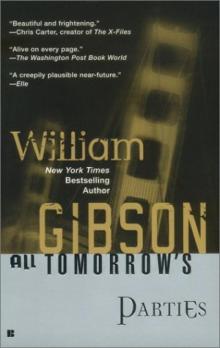 All Tomorrow's Parties
All Tomorrow's Parties The Miracle Worker
The Miracle Worker Disneyland with the Death Penalty
Disneyland with the Death Penalty Idoru tb-2
Idoru tb-2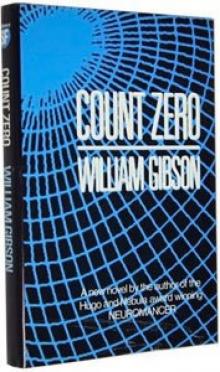 Count Zero s-2
Count Zero s-2 The Gernsback Continuum
The Gernsback Continuum New Rose hotel (tales)
New Rose hotel (tales)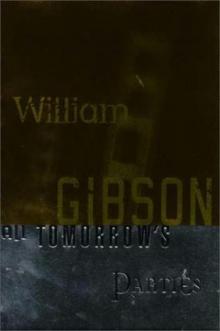 All Tomorrow's Parties bt-3
All Tomorrow's Parties bt-3 Hinterlands
Hinterlands Thirteen Views Of A Cardboard City
Thirteen Views Of A Cardboard City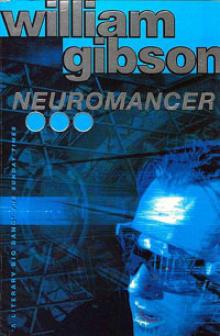 Neuromancer ts-1
Neuromancer ts-1 Virtual light b-1
Virtual light b-1